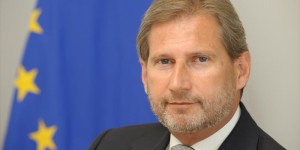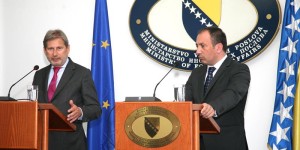“Security and Democratisation in the Western Balkans: Consolidating Stability, Pushing Reforms”
Panel I: “Prospects for EU and NATO Enlargement in South-Eastern Europe”
Distinguished guests, ladies and gentlemen,
I
am pleased to be here with you to discuss under the auspices of the
NATO Parliamentary Assembly how to consolidate stability and advance
reforms in the Western Balkans.
There could be hardly a more relevant and timely subject than this one when it comes to Bosnia and Herzegovina.
The
European Union remains fully committed to consolidating the stability
of BiH and is helping to anchor the country's economic and political
reforms in the EU accession path.
It is no secret that BiH has
offered for years a particular challenge by combining persistent
post-conflict features with being a potential candidate country. Many
are again calling for a ‘special’ approach to BiH EU integration. Yet,
few seem to notice that the EU has already created a tailor-made
approach for BiH. For instance, the EU reinforced its presence to
include, besides a fairly large EU Delegation, a strong office of the EU
Special Representative and a CSDP military mission.
The latter
performs an important function in consolidating the stability of BiH on
building the capacity and training the Armed Forces of BiH and in
consolidating the integrity of BiH, a key element for BiH to progress on
the NATO integration path.
The EU High Representative Baroness
Ashton, on her recent visit to Sarajevo remarked that EU will not lower
the bar for BiH, but instead will help the country (and its citizens) to
jump over it. This means that drive and leadership for reforms have to
come from within and have to have support of citizens.
Stagnation
in the current status and perspectives for BiH European integration
takes place against a positive dynamic in the neighbourhood, ranging
from Croatia's recent EU membership to Serbia's diligent pursuit of its
European path.
Bosnia and Herzegovina is falling very seriously
behind on its European integration agenda. Our “contract” – the
Stabilisation and Association Agreement was signed in 2008, but has not
yet entered into force. We witness serious delays in approximating local
laws to EU acquis, failed attempts to introduce EU standards that often
result in direct loss of revenues for business and budget alike, like
in the case of stalled export of milk and dairy products to Croatia,
after the latter joined EU.
In the last weeks, in a series of
high level visits, the EU sent a loud and clear message pleading for
necessary and long-awaited change to the leaders, who often looked
detached and helplessly overtaken by the social turmoil that stormed
throughout the country in February.
Citizens, on the contrary, have
been very clear in expressing their ambitions and concerns. They want
employment opportunities and a growing economy, a social welfare system
that works, they want the rule of law, and an efficient justice system.
A
crucial element to drive the EU agenda forward is missing in answering
to these requests; that is the political will of the leaders to look
beyond ethnic divisions, and look after the interests of all the people.
Reforming the economy, the social welfare system and promoting foreign
trade; Strengthening the rule of law and Protecting human rights are the
fundamentals which the EU Enlargement Strategy 2013-2014 targets as a
matter of priority.
As part of this framework, the Commission
launched recently a new approach to economic governance, competitiveness
& growth for the Western Balkans region. The aim is to offer more
concrete and better targeted support to the region in meeting the
challenges of creating jobs, enhancing competitiveness and boosting
growth and help the countries benefit from the experience the Union
gained during the economic crisis.
A month ago in Sarajevo,
Commissioner Fuele launched three new initiatives aimed to address
current social and economic concerns in Bosnia.
The EU plans to
assist Bosnia and Herzegovina to prepare a National Economic Reform
Programme. This aims to push forward reforms and actions to tackle this
country's dysfunctional labour market, get better co-ordination on
economic and fiscal policies and create a better environment for
business.
With the same aim, the EU will also propose a
Competitiveness and Growth Programme to push forward the sectoral
reforms – in, for example transport, telecoms and energy – that will
enhance BiH's competitiveness, unlock investments, growth – and
employment. The programme's implementation will also benefit from
present and future IPA assistance. The money will be connected with the
priorities of this programme to address economic and social challenges
in the country.
A second initiative is the formation of a joint
EU-BiH working group to accelerate the implementation of EU funded
projects. There are 210 million Euro of projects on-going and another
almost 150 million Euro for projects yet to be contracted or
programmed.
The working group aims to make sure that the
projects target concerns in the economic and social areas and there are
very clear social and economic benefits produced for communities. These
issues include more support for small and medium enterprises, more
social inclusion programmes, faster processing of cases in courts, and
more efficient use of taxpayers’ money.
The third initiative
aims to expand the Structured Dialogue on Justice to tackle some of the
elements – important for Bosnia and Herzegovina – of Chapter 23 of the
EU acquis. Let me recall that Chapter 23 deals with the fundamental
freedoms and judiciary, including fight against corruption. A seminar on
setting additional priorities for Structured Dialogue on Justice has
recently been held in Sarajevo involving civil society and bringing
about a renewed engagement in challenging areas that hold BiH from
progressing on its European agenda.
Anti-corruption policies
will be high on the agenda. This is in line with the assessment made by
the European Commission already for the past few years. In the last
Progress Report for the year 2013, the Commission stressed that “complex
connections between political actors, business and the media are
putting democratic institutions and procedures at risk and making the
detection of corrupt practices more difficult.”
Discussions will
also cover other potential reform priorities, including in the field of
fundamental rights, home affairs and fight against organised crime.
Engaging on aspects relevant to the entrenchment of the rule of law is a
feature of the bilateral relations also between the EU and other
potential candidate countries. In the case of BiH, the focus so far had
mostly been placed on the functioning of the judiciary.
The EU
maintains a strong commitment to maintain a proper and consistent
involvement of the civil society, which will have a crucial role in in
all future endeavours in this framework.
To summarize, the EU
will keep its commitment and continue to offer targeted and tailor made
support for advancing the EU integration process of BiH. Progress on the
EU path is critical for ensuring the security and stability not only in
BiH, but also in the region. For BiH it will mean turning a page of
history and making its troubled past stay in the past. However, the
drive can only come from within the country. Pushing a reform agenda
requires strong leadership, courage to move beyond a comfortable, but
unsustainable status-quo which often suits vested interest groups but
does not respond to the voices of the citizens, and last but not least –
accountability from the political establishment.
Thank you for your attention!



